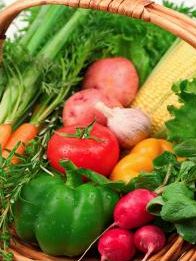It's a New Day in Public Health.
The Florida Department of Health works to protect, promote, and improve the health of all people in Florida through integrated state, county, and community efforts.
Fruits and Vegetables - More Matters Month
September 09, 2014

Most people know that eating fruits and vegetables is important for good health, but most of us still aren’t getting enough. This September, Florida Department of Health in Suwannee County, is proud to promote Fruits & Veggies – More Matters Month.
People who eat a healthy, balanced diet with plenty of fruits and vegetables can help lower their risk for:
- Some types of cancer
- Heart disease, including heart attack and stroke
- Type 2 diabetes
- High blood pressure
- Obesity
However, many people do not eat enough fruits and vegetables.
- Only 1 in 3 adults eat the recommended amount of fruits every day.
- Only 1 in 4 adults eat the recommended amount of vegetables every day.
Forget the old “5 a Day” campaign, which dates back to the early 90’s! Studies now show that MORE IS BETTER, and that adults need anywhere from 7-13 cups of produce daily to get all the health benefits of fruits and vegetables.
For many of us, it has always been a challenge to fit even five servings of fruits and veggies into our daily diets. How can we hope to eat as many as 13 cups? Here are some tips to help get you there:
- Keep a bowl of fruit handy where the whole family can see it.
- Cut up fruit and veggies ahead of time so they’re ready for quick, healthy snacks.
- Challenge your family to try a new veggie or fruit every week.
- For best flavor and good value, buy fresh produce in season.
- Always keep a stash of frozen vegetables on hand, to toss into soups, salads, stews, and egg dishes or microwave for an easy side dish.
- Splurge on pre-washed, pre-cut fruits and vegetables.
- Vary the texture. Kids, especially, like raw, crunchy fruits and veggies with low-fat dip. Try shredding vegetables to top sandwiches or salads.
- Choose sweet potatoes over white potatoes for more potassium and beta carotene.
- Go easy on sauces. Instead, flavor vegetables with fresh or dried herbs and a splash of lemon juice or balsamic vinegar.
- Have a vegetarian meal at least once a week. It can be as simple as a soup and salad or a stir-fry meal.
- Eat a salad full of fruits and/or veggies each night with dinner. Go easy on the dressing and high fat toppings.
- Grill fruits and vegetables to make them sweeter and more delicious.
- Chop, dice, or shred vegetables into muffins, stews, lasagna, meatloaf, and casseroles.
- Use pureed vegetables to thicken soups, stews, gravies, and casseroles.
- Decorate plates with edible garnishes, like cucumber twists, red pepper strips, or cantaloupe slices.
- Remember that while 100% fruit juice is a good choice; whole or cut-up fruit has the added benefit of fiber.
- At breakfast, add fruit to yogurt, pancakes, waffles, or cereal.
- Whip up a smoothie made with fruit and low-fat or nonfat yogurt for a quick, nourishing snack or meal.
- Freeze grapes and bananas for a refreshing and cool treat.
Finally, with two-thirds of American adults overweight, the weight-control benefits of fruits and veggies are especially important. Fruits and vegetables contain plenty of fiber and water to help you feel full, and, thus, prevent overeating. Substituting fruits and vegetables for “empty calorie” foods that offer little nutritional value can really make a difference in your weight, as well as provide you with more energy and a generalized over-all feeling of better health.





Connect with DOH